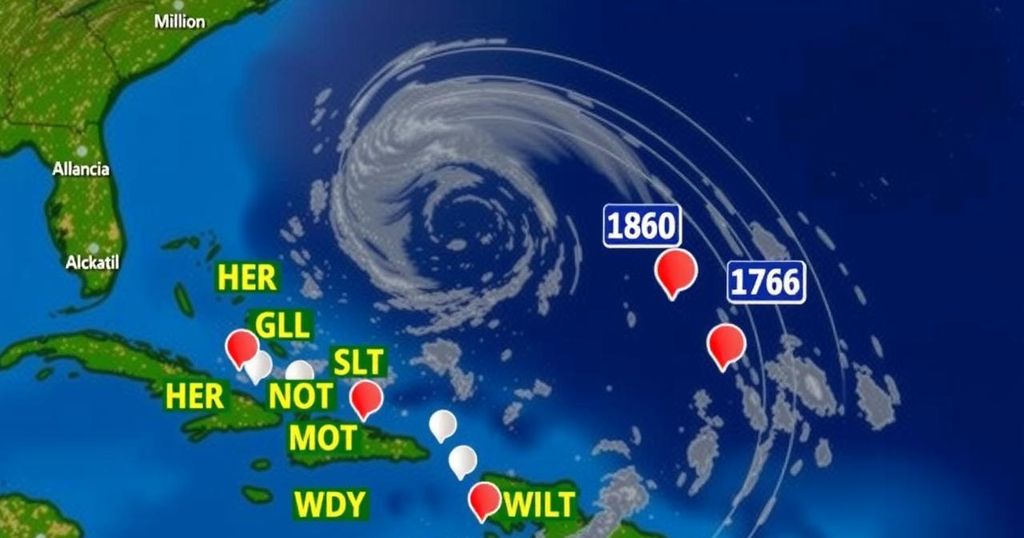Weather
World news
AFRICA, ARKANSAS DEMOCRAT GAZETTE, ASHEVILLE, ATLANTIC, BE, BERMUDA, BRIAN MCNOLDY, CARRIACOU, CUBA, DOMINICAN REPUBLIC, EUROPE/ASIA, EVACUATIONS, FLORIDA, GEORGIA, GRENADA, GULF COAST, GULF OF MEXICO, HELENE, HURRICANE, HURRICANE SEASON, JAMAICA, KATE, NATIONAL HURRICANE CENTER, NATURAL DISASTER, NATURAL DISASTERS, NORTH AMERICA, NORTH CAROLINA, ORLANDO, RAFAEL, SOUTH AFRICA, SOUTH CAROLINA, TAMPA, TENNESSEE, U. S, U. S. GULF COAST, UNITED STATES, UNIVERSITY OF MIAMI, VIRGINIA
Michael Grant
0 Comments
Recap of the 2024 Atlantic Hurricane Season: A Record-Breaking Year
The 2024 Atlantic hurricane season ended with 11 hurricanes, exceeding the average. It included significant storms such as Hurricane Beryl, the earliest ever Category 5 hurricane, and Hurricane Helene, which caused over 200 deaths and $48 billion in damages. The season highlighted the influence of warm ocean temperatures on hurricane activity, emphasizing climate change’s role in intensifying such weather events.
The 2024 Atlantic hurricane season concluded on Saturday with a total of 11 hurricanes, surpassing the average of seven. This season was marked by severe impacts across the U.S. Gulf Coast despite being hundreds of miles away from where the storms made landfall. Meteorologists described this year as “crazy busy,” primarily attributed to unusually warm ocean temperatures.
A significant development was the formation of Hurricane Beryl, the first Category 4 hurricane on record to emerge in June, impacting Grenada severely, resulting in two fatalities and considerable destruction to infrastructure and agriculture. Furthermore, Hurricane Beryl escalated to become the earliest Category 5 hurricane in recorded history on July 1, a feat unusual for that time of year.
In September, Hurricane Helene wreaked havoc across the southeastern U.S., claiming over 200 lives and prompting extensive damage estimated at $48.8 billion, particularly affecting North Carolina. Other states including Florida, Georgia, South Carolina, Tennessee, and Virginia also experienced widespread destruction.
October brought Hurricane Milton, which became one of the strongest hurricanes recorded in the Gulf of Mexico, achieving wind speeds of up to 180 mph, second only to Hurricane Rita from 2005. The intense rains brought by Helene and Milton resulted in reservoirs receiving three times their average rainfall for September and October.
November witnessed Hurricane Rafael reaching winds of 120 mph, making it nearly the strongest November hurricane in the Gulf, as it caused additional hardships for Cuba while recovering from Hurricane Oscar. The rising temperatures of oceans can be attributed to greenhouse gases, notably carbon dioxide and methane, leading to unusual hurricane activity during unexpected months. Meteorologist Brian McNoldy highlighted this trend, indicating that climate change influences the likelihood and intensity of these storms.
The 2024 Atlantic hurricane season was characterized by an unprecedented number of hurricanes, influenced significantly by climate change and warmer ocean temperatures. Historical data indicates that such conditions lead to hurricanes forming earlier and later than typically expected. The consequences of these storms include substantial loss of life and extensive damage across communities, highlighting the urgent need for awareness and preparedness in light of changing climatic conditions. Meteorologists are increasingly observing patterns that tie the intensity and timing of hurricanes to broader environmental changes, raising awareness regarding the implications of climate variability on weather phenomena.
In summary, the 2024 Atlantic hurricane season was notable for its unprecedented number of hurricanes and the extreme nature of these storms. The unusual early formation of Hurricane Beryl as a Category 4 hurricane and the destructive aftermath of Hurricane Helene call attention to the effects of warmer ocean temperatures associated with climate change. This season serves as a stark reminder of the growing intensity and frequency of hurricanes, necessitating proactive measures in disaster management and climate resilience.
Original Source: www.arkansasonline.com




Post Comment